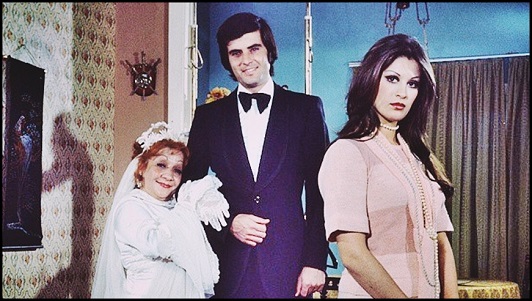Actually, I’m not in a position to write much, but I tried to write the abstract of this article as a fidelity before I go into total silence after I’ll complete and post the article, most of which I wrote with my baby boy on my lap. Kartal Tibet (age 83), one of Yesilcam’s (Traditional Turkish Cinema) most popular lead actors in the 60s and 70s, has passed away. Although Kartal Tibet has never been an actor in my focus, I grew up with Yesilcam films like many other people of Turkey from my generation who had childhood in the countryside – maybe Yesilcam movies were the only entertainment of the rural people in Turkey before television, together with the radio. I watched hundreds of Tibet’s movies, that’s why I’m talking about fidelity.
He was born to both teacher parents in the capital city Ankara (his father was also a lawyer). He entered the TRT (Turkish Radio and Television Corporation) Children’s Club at the age of 11, and a year later, the State Theaters Children’s Theater. In the same year, he appeared on the stage with a children’s play “Kara Boncuk/Black Bead”. Later, he won the Ankara State Conservatory Theater Department and graduated from its higher department in 1960. While he was a student at the Conservatory, he took part in many plays, including Shakespearean classics such as “Hamlet” and “Othello” at the Ankara State Theatre. After graduating from the conservatory, he joined the Ankara State Theater staff and received an award for his leading role in Albert Camus’ “Caligula”.
After he had left the State Theater, he established the first private theater of Ankara, Meydan Sahnesi (Meydan Stage), the cast of which was mostly composed of actors who had left the State Theatre, together with late Cetin and Mediha Koroglu, late Mahir Canova, late Selcuk Uluerguven, late Adalet Agaoglu, Uner Ilsever and Haldun Dormen and became the principal actor of this theatre. He acted the lead role in most of the plays of the Meydan Sahnesi and became an important name in the theater at a young age. He also directed five plays in the theater.
At that time, Karaoglan, a serial comic strip about a Turkish hero from Central Asia, which was serialized and published as a comic strip magazine in Turkey, was very popular. Karaoglan’s illustrator Suat Yalaz decided to film the comic strip. From Ayhan Isik, the greatest lead actor of the era, to Yilmaz Guney, to Cuneyt Arkin, all Yesilcam lead actors wanted to get the role of Karaoglan. The film was widely covered in the media for a long time before it was shot. Yalaz announced that he would choose the actor to get the role of Karaoglan in a competition and continued its advertisement. In the end, the role was performed by Kartal Tibet, one of the tall, young and handsome lead actors of Ankara theaters. After Karaoglan’s shooting in 1965, Kartal Tibet, a well-known theater actor in Ankara, suddenly became a well-known movie actor throughout Turkey and was included in Yesilcam’s lead actors.
Tibet was not a much talked about actor in theater circles, at least in my time. But when he was seldom mentioned, my colleagues of his generation always spoke of him as a good actor in theatre. But I never watched Tibet as a good actor in Yesilcam movies; he always had a very cliché and pretentious acting. And he never took part in an important movie that remained in the history of Turkish cinema. But during his years as an actor in cinema between 1965 and 1975, Tibet was always among the top five most popular lead actors and his films done well commercially. Tibet continued the Karaoglan character in cinema with movies for five years in a row. In 1969, he became Sezgin Burak’s Tarkan, which was another popular comic strip about a central Asian Turkish hero again. He continued his Tarkan typography for five years with successive movies. Tibet was once one of the two box-office stars of fantastic historical adventure movies in Turkey, together with Cuneyt Arkin playing the comic strip characters Malkacoglu and Kara Murat, one after the other. Apart from the fantastic historical hits that brought him great fame, Tibet also became one of the sought after lead actors of melodramas and romantic comedies of major film companies. He was the lead actor who shared the lead roles the most with Turkan Soray, Filiz Akin, Fatma Girik and Hulya Kocyigit, the four biggest iconographic female stars of all times in Turkish cinema, known as “Four Leaf Clover” or “Square ace”. For a period, Tibet and Akin was considered one of the ideal cinema couples.
Tibet married Gunduz Tibet who was the ex-wife of Mahir Canova who had been his master at the conservatory and his closest teacher before he became a movie star. Unlike other popular lead actors of the period, his name was never involved in a love affair. He led a closed family life with his wife, his wife’s mother, Civan Canova, one of today’s well-known theater actors and playwrights from his wife’s first marriage, and their two children in common.

He was mentioned in the books of very few of the cinema personalities who wrote their memoirs of the period. Contrary to Cuneyt Arkin, who harmed those around him when he drank, he was mentioned as a introverted person who only harmed himself when he drank and who drank heavily. I never met Tibet in person; I only saw him a few times drinking alone at Papirus, one of the favorite pubs of the period of the actors, directors, artists, etc. ; he looked very old and physically deformed. Unfortunately, due to my age, I never watched him as an actor on theater stages, I only watched a play he staged as a director at the Istanbul State Theatre, which was unremarkable.
When Tibet left the cinema in 1975, unlike other Yesilcam stars of his time, he disappeared from the tabloids altogether. He was not photographed or gave any interviews, he did not get involved in anything that would go to the media as news. He just disappeared suddenly. Tibet disappeared but did not break away from the cinema. In 1975, he assisted Ertem Egilmez whom he had acted the leading roles in his previous films, in his cult film “Hababam Sinifi/Hababam Class” and joined Egilmez’s team. A year later, in 1976, he became the director for the first time in the cult film “Tosun Pasa/Tosun Pasha” in which Kemal Sunal played the leading role under the production of Egilmez. He directed 60 films as a director, almost making forget his actor identity. He became one of the directors who made the most films, especially with the comedian Kemal Sunal. Apart from the Sunal films, Tibet’s most important films, were “Sultan” and the Lystrata adaptation “Salvar Davasi/Shalwar Problem”. He was also in the script team of most of his films. The last image of Tibet I watched on the screen was in a Sunal film “Sabaniye”, which he also directed. In the movie, he who acted as an old Yesilcam lead actor without dialogue and transvestite singer Sabaniye ran to each other in slow motion as a Yesilcam cliché in the rig ran by Sabaniye within the movie.
In recent years, 60’s Yesilcam stars, who were competitors and avoided coming together during their period, have appeared as a clan at festivals and special nights. Despite playing the leading roles in 119 films, Tibet, who tried to make forget his actor identity, never entered that clan, did not accept the honor awards given to former Yesilcam stars. The number of interviews he gave after he quit acting did not exceed two or three.
In one of these interviews, he said “The quality of the audience in the theater was high, but their number was very small. In the cinema, I had the chance to announce my work to a wider audience. Thus, I moved on to Turkish cinema, whose place is better seen and accepted today, with all its merits and deficiencies. Since I had an academic acting education, I also saw Turkish cinema as incomplete and belittled at the beginning. I’m sorry for that. My first film did a great job and we immediately moved the house to Yesilcam with a 15-film contract. Turkish cinema was very decadent, very primitive, lacking in technical possibilities, the stories were very simple but very clear, very sincere. As a matter of fact, movies almost started by admitting this. There were people who were prejudiced without ever going to a Turkish movie or watching the movies. My neighborhood was full of them too. I would make fun of them. Since we are sharing an era, something is going on, go to five Turkish movies a year, bro. Go even to criticize. Those who condemned what was written in the newspaper that day, with hearsay, watch those movies on television and the Internet today and say, ‘I never watched them, now I watch them with liking’. Then look in the mirror, get mad at yourself. Because you were wrong for not watching on time. Yes, we are rudimentary, but very cute things have also been done, pretty things. Everything was done that way in Turkey anyway. Then please show me what was a more advanced branch than Turkish cinema.”
In line with his last will, there will be no ceremony at Tibet’s funeral.
For the fresh memory of Kartal Tibet, “My Gentleman Friend, Soon It’s Gonna Rain” by Blossom Dearie’s jazz vocal and piano comes in the below link.
This article has been written by Mehmet Atak for Sinematik Yeşilçam – July 2021












